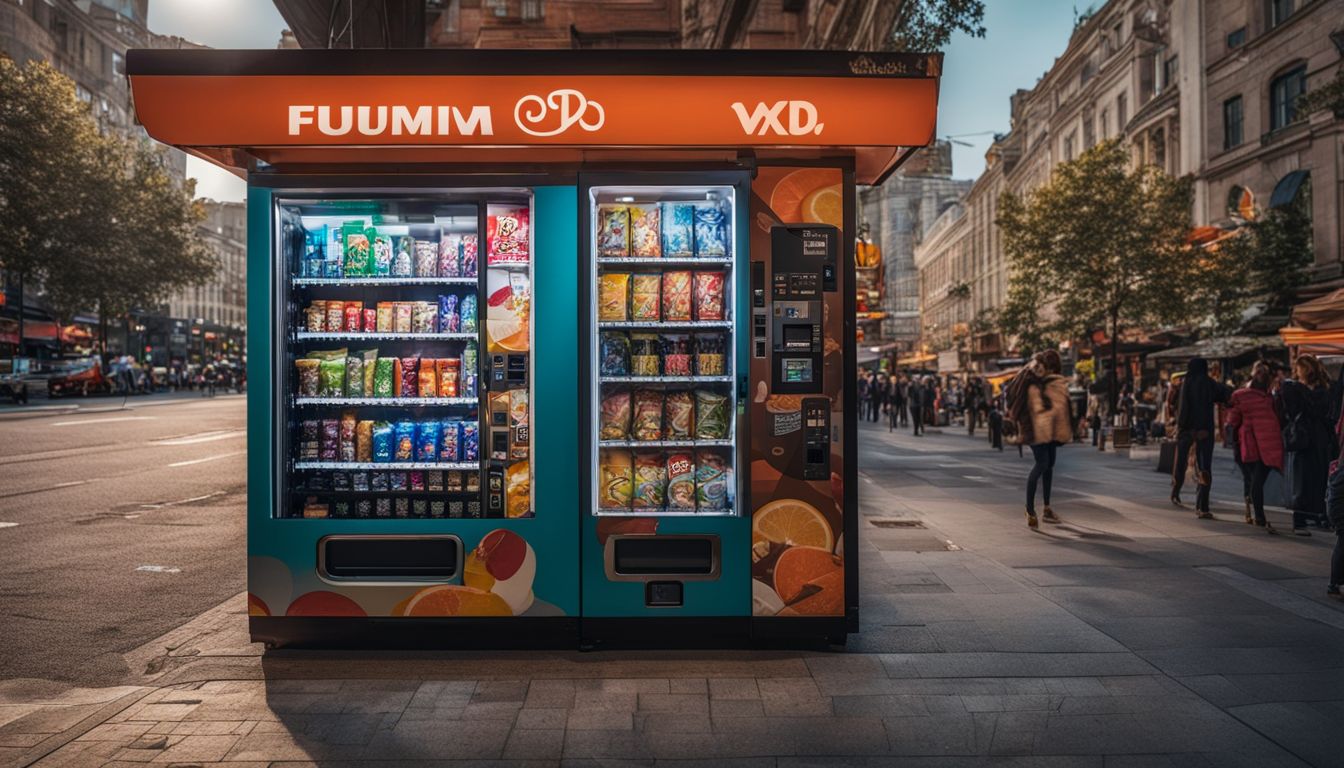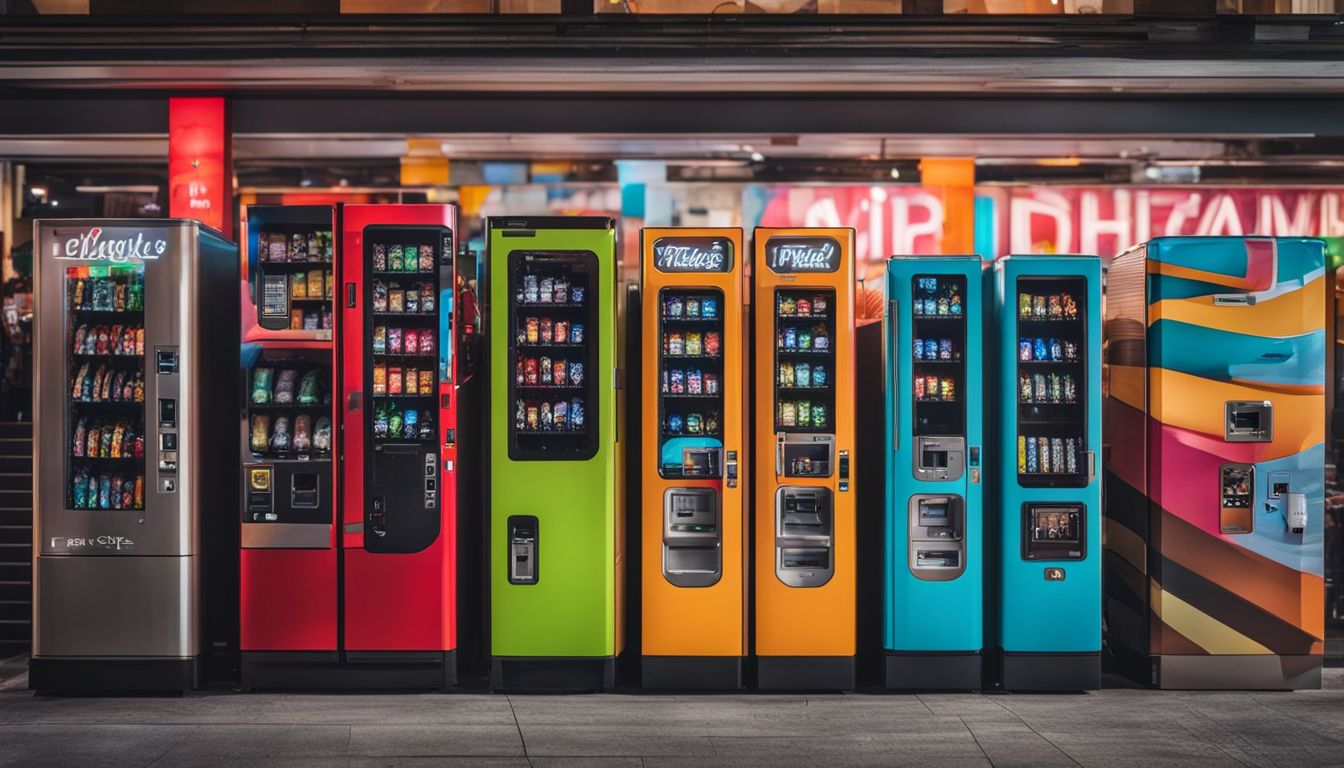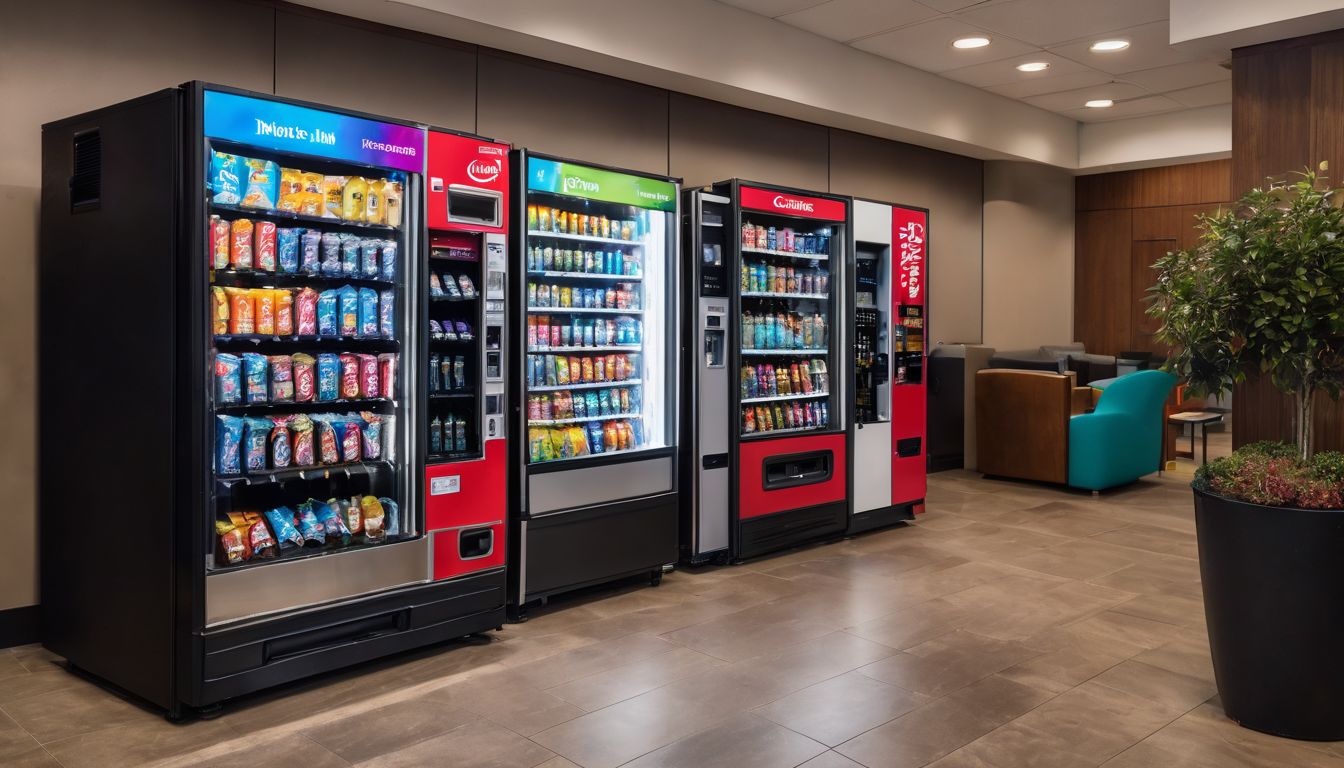Considering launching your own vending machine business? It is an easy-to-start, profitable venture with minimal operations costs. This seven-step guide walks you through the process from identifying what to sell, choosing the perfect location and machine, to obtaining necessary permits and stocking up inventory.
Let’s jump in and discover how a simple automated business can become a successful revenue stream!
Key Takeaways
- A vending machine business sells items through a device that allows customers to make purchases using coins or cards, and it operates without the need for a salesperson.
- To start a successful vending machine business, it is important to conduct market analysis by considering factors like demographics, trends, competition, and profitability.
- Key steps in starting a vending machine business include identifying what products to sell based on customer preferences, finding a suitable location with high foot traffic, choosing the right vending machines with features like cashless payment options and inventory tracking systems, obtaining necessary permits and licenses to operate legally, maintaining and restocking machines regularly to provide reliable service, and continuously reviewing operations for optimization.
What is a Vending Machine Business?

A vending machine business sells items through a device. You put coins or cards in this device to buy things like snacks, drinks, and more. The best part about this type of business is that it works on its own.
Once you fill the machine with goods, there’s no need for a salesperson.
This kind of business has big wins for anyone looking to start their own venture. It needs little money upfront and can bring in cash around the clock. Plus, with clever choices about what to sell and where to put your machines, they can make lots of money while you handle other tasks.
Market Analysis for Vending Machine Businesses

The market analysis for vending machine businesses includes analyzing demographics, trends, competition, and profitability.
Demographics
Understanding the demographics of your potential customers is a crucial factor in starting a vending machine business. It helps you identify what type of products or services are in demand and will sell well.
| Demographic Factors | Description |
|---|---|
| Age | This indicates the age range of your potential customers. Sell products that appeal to this age group. |
| Gender | Knowing the gender of your target audience can influence the type of products you stock in your vending machine. |
| Economic Status | This can help you determine the pricing of your vending machine items. |
| Occupation | Identifying the occupations of potential customers can help you decide on the location and type of vending machine. |
| Location | The geographical area plays a significant role in vending machine business success. Scouting for a suitable location is essential to maximize foot traffic and potential sales. |
Remember to align your vending machine selection and product choices with the specific needs and preferences of your target demographics to ensure the success of your business.
Trends
Trends shape the vending machine business. Many changes have come in recent years. Now, vending machines sell more than just snacks and drinks. You can find ones that sell tech items like earbuds or phone chargers.
This switch came because people want new things to buy from a vending machine. Also, having a card reader or a way to pay with your phone on a vending machine is very important now.
Even more, some people care about the Earth and want machines to be “green” or healthy too!
Competition
Competition in the vending machine business can be fierce, so it’s important to stand out from the crowd. Look at other vending machines in your area and see what they’re offering.
Find a niche or unique selling point that sets you apart. Consider offering healthier snack options or specialty products that cater to specific dietary needs. Also, think about the location of your vending machine and try to find spots where there is less competition but still a high volume of potential customers.
By doing thorough market research and finding ways to differentiate yourself, you can increase your chances of success in this competitive industry.
Profitability
To ensure the profitability of your vending machine business, it’s important to consider a few key factors. First, carefully choose the products you’ll sell in your machines. By offering popular and high-demand items, you can increase sales and generate more revenue.
Additionally, keep an eye on the cost of acquiring these products. Try to negotiate good deals with suppliers to maximize your profit margins.
Next, take into account the operational costs associated with running your vending machines. This includes expenses like electricity, machine maintenance, and restocking supplies. By monitoring these costs and finding ways to minimize them without compromising quality or service, you can improve your overall profitability.
Lastly, don’t forget about location! Finding strategic spots for your vending machines is crucial for success in this business. Look for areas with high foot traffic where people are likely to stop by and make a purchase.
By placing your machines in lucrative locations, you’ll have a greater chance of attracting customers and boosting profitability.
Steps to Starting a Vending Machine Business
In starting a vending machine business, there are several key steps to follow. These include identifying what products to sell, finding a suitable location, choosing the right vending machine, obtaining necessary permits and licenses, maintaining and restocking the machines regularly, and continually reviewing and optimizing operations for maximum profitability.
Identifying what to sell
To start your vending machine business, you need to decide what products you want to sell. This is an important step because the success of your business depends on offering items that people want and will buy from your machines.
Take the time to research popular products in your target market and consider factors like customer preferences, trends, and profitability. It’s also a good idea to analyze the competition and see what they are selling.
By identifying what to sell, you can ensure that your vending machines offer desirable products that will attract customers and generate revenue for your business.
Finding a location
To start a vending machine business, finding the right location is crucial. Look for areas with high foot traffic, such as shopping malls, office buildings, or schools. Busy technology hubs or recreational spots can also be great places to set up your vending machine.
Consider renting space from property owners or approaching businesses directly to negotiate placement. Remember to get permission and sign agreements before placing your machines. By choosing a strategic location that attracts your target customers, you increase the chances of success for your vending machine business.
Choosing a vending machine
When starting a vending machine business, choosing the right vending machine is a critical step for success. Consider factors such as the type of products you want to sell, the target market, and your budget.
Look for vending machines that have features like cashless payment options and inventory tracking systems to streamline operations. Additionally, research different types of machines such as snack or beverage machines to find one that aligns with your business goals.
Remember to consider factors like durability, energy efficiency, and ease of maintenance when making your decision. By selecting the right vending machine, you can maximize profits and provide a better experience for your customers.
Obtaining necessary permits
To legally operate a vending machine business, you need to obtain the necessary permits and licenses. Before starting your business, it’s important to check the state and local laws regarding vending machine operations.
These laws may vary depending on where you plan to operate your business. Make sure to comply with all regulations and obtain any required permits or licenses before launching your business.
Getting the necessary permits involves filling out applications and submitting them to the appropriate government agencies. The specific requirements will depend on your location, but some common permits include health department permits, sales tax permits, and zoning permits.
It’s crucial to follow the application process correctly and provide all requested information.
By obtaining the necessary permits, you can ensure that your vending machine business operates within legal boundaries. This not only protects you from potential penalties but also ensures that customers can trust your operation as a reputable business in compliance with regulations.
Maintaining and restocking
To ensure the success of your vending machine business, it is essential to maintain and regularly restock your machines. This involves checking inventory levels, monitoring product expiration dates, and cleaning the machines to keep them in good working condition.
By staying on top of these tasks, you can provide a reliable service to your customers and avoid any potential issues with expired or malfunctioning products. It’s also important to establish relationships with suppliers who can deliver fresh stock on a regular basis to keep your vending machines fully stocked at all times.
With proper maintenance and consistent restocking, you can maximize profits and customer satisfaction in your vending machine business.
Reviewing and optimizing operations
After setting up your vending machine business, it is essential to regularly review and optimize your operations. This involves assessing the performance of your vending machines, analyzing sales data, and identifying areas for improvement.
By reviewing operations, you can determine which products are selling well and which ones are not as popular. This information will help you make informed decisions about what items to stock in the future.
Additionally, optimizing operations means ensuring that your machines are properly maintained and stocked at all times. Regularly restocking inventory as needed will help attract customers and increase revenue.
Conclusion
Starting a vending machine business can be an exciting venture for those looking to start their own business. By following the seven steps outlined in this guide, you can set yourself up for success.
From conducting market research to choosing the right vending machine and stocking it with appealing products, each step is crucial in building a profitable and automated business.
So why wait? Start your journey towards owning a successful vending machine business today!
FAQs
1. How much money do I need to start a vending machine business?
The amount of money you need to start a vending machine business can vary, but it’s important to budget for the cost of purchasing or leasing machines, stocking inventory, and any necessary permits or licenses.
2. Are there any specific locations that are better for placing vending machines?
Yes, it’s important to choose high-traffic areas with potential customers such as office buildings, schools, shopping centers, or hospitals for better chances of success in your vending machine business.
3. Do I need any special skills or experience to run a vending machine business?
No, you don’t need any special skills or experience to run a vending machine business. Basic management and customer service skills will be helpful in managing inventory and providing good customer experiences.
4. How often should I restock my vending machines?
The frequency of restocking your vending machines depends on factors like location and demand. It’s recommended to keep track of inventory levels regularly and restock when items are running low.
5. What types of products can I sell in my vending machines?
You have flexibility in the types of products you can sell in your vending machines including snacks, beverages (both hot and cold), healthy food options, personal care items, or even electronics depending on your target market preferences and local regulations.




